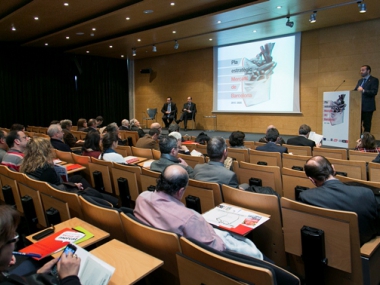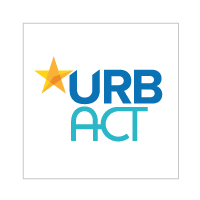Barcelona presents 2015-2025 Strategic Plan for City Markets
Edited on
14 February 2017Plan brimming with measures and actions to implement over the next ten years gets backing from markets stakeholders

Barcelona City Council has officially presented its Strategic Plan 2015-2025 for Markets to councillors. The objective: to renovate and modernize city markets to meet citizen’s needs and social changes. The plan has 39 policy and 153 concrete actions to implement over the next ten years.
The Strategic Plan for Markets came about from Barcelona’s participation in the European Union (EU) URBACT MARKETS project which is led by Barcelona with 8 partner cities: London (through the City of Westminster, UK), Torino (Italy), Suceava (Romania), Dublin (Ireland), Toulouse (France), Pécs (Hungary), Wroklaw (Poland) and Attica (Athens Region), funded by the EU’s Regional Development Fund to promote city development through markets.
The participatory process
Barcelona’s Strategic Plan 2015-2025 for Markets is the result of a year-long participatory process consisting of working groups with some 250 people linked directly or indirectly to the world of markets and retail in Barcelona.
The socio-economic impact of markets in Barcelona is huge. The Plan offers recommendations for some key issues facing markets in Barcelona:
Firstly, economic challenges: tools to increase consumption and markets usage especially in times of recession; secondly, social challenges: markets must meet customer demands and generate life in their local neighbourhoods; thirdly, technological challenges: markets need to embrace new technologies; fourthly, legal and administrative challenges: adapting regulations to a changing reality; fifthly, environmental challenges: the growing demand for zero km products, best practices in waste management, the supply chain management, etc...; and fifthly, policy challenges: the need to get buy-in in a timely fashion.
Structure Plan
The Plan process set about determining the very basis of markets policy by looking at fundamental issues like the reason for markets (soul), their driving force (motor), and how they can be used to promote sustainability. The soul shows how markets are part of Barcelona’s neighbourhoods root values, a way of life. Motor refers to the fact that markets are drivers of local neighbourhood economies, whilst also being interesting policies to follow internationally, and how markets create jobs and generate wealth. Sustainability is seen in the social values associated between markets and the environment and culture
These three areas are broken down into 12 goals, 39 policy measures and 153 actions to develop over the next ten years.
1. Soul (S)
Markets are a benchmark for life in Barcelona. They provide an experience not only when shopping but also in quality of life.
S.1: Consolidate market’s as a central part of neighbourhoods
- S.1.1: Define specific strategies for each type of market.
- S.1.2: Position markets as a place to generate unique experiences for shopping and socialising.
- S.1.3: To provide consumers with added value that differentiates them from other food retailers.
S.2: Keep on transforming neighbourhoods via market renovation.
- S.2.1: Update and redesign the remodelling process.
- S.2.2: Maintain and enhance the public-private financing model for remodelling markets.
- S.2.3: Designing spaces inside and outside markets for social and civic use.
S.3: Strengthen the commitment of traders to the market and the network
- S.3.1: Build and promote shared values and vision for the markets of Barcelona.
- A.3.2: Fostering closer relations with citizens in their role as consumers.
- S.3.3: Adapt and standardize business hours for citizens.
- S.3.4: Update a regulatory framework for the strategic vision of the markets.
- S.3.5: Promote joint initiatives between markets and the network of markets
S.4: Strengthening the relationship market - local trade
- S.4.1: Encourage ongoing collaboration between markets and local trade.
- S.4.2: Monitor the implementation and interpretation of PECAB (Special Commercial Plan for Food Facilities in Barcelona).
2. Motor (M)
Market retailing leads each neighbourhood and is a model of international planning. Markets are a key factor in economic development and job creation in each district.
M.1: Leading the distribution of fresh food in the city of Barcelona
- M.1.1: Positioning itself as the principal place to purchase fresh produce, from the point of view of quality, variety and price.
- M.1.2: Enhance service quality through personalization and customer service.
- M.1.3: Develop an information system showing competition and consumer trends that facilitate decision making.
M.2: Continue to lead a management model for municipal urban markets
- M.2.1: Maintain and innovate a management model for public-private development of markets.
- M.2.2: Strengthening its institutional position as a leader in Catalonia and in the field of urban markets.
- M.2.3: Positioning itself as an international benchmark in the field of urban markets.
- M.2.4: Develop consultancy advisory services at IMMB.
M.3: Promoting a model of sustainable management market
- M.3.1: Promoting a management model for competitive markets.
- M.3.2: Develop a training plan for traders.
- M.3.3: Promoting a professional relief plan between generations and transmission of knowledge.
- M.3.4: Develop and subsequently exploit synergies with private operators.
- M.3.5: Developing a digital channel as a tool to stimulate market activity.
M.4: Keep targeting consumers
- M.4.1: Develop a flexible consumer loyalty.
- M.4.2: Promote R&D (Research, Development & Innovation).
- M.4.3: Attract, develop and attract new groups of consumers.
- M.4.4: Exploit synergies between trade-tourism.
3. Sustainability (S)
Markets are synonymous with social values associated with sustainability, environmental and cultural.
S.1: Promotes markets as a source of Catalan food heritage
- S.1.1: Increase the presence of ranges of local products at local markets.
- S.1.2: Participate in improving channels with stalls for local products and added value.
S.2: Position markets as a place for training on healthy eating habits, food and food security
- S.2.1: To encourage scientific debate and gourmet markets.
- S.2.2: Promote training aimed at retailers and consumers about food.
- S.2.3: Further information aimed at consumers.
S.3: To ensure the economic and environmental sustainability of the equipment markets
- S.3.1: Encourage awareness and environmental management.
- S.3.2: Proposing new markets to remodel from the perspective of economic and environmental sustainability.
- S.3.3: Encourage responsibility in the maintenance of markets by traders.
S.4: Strengthen the market as a defender of social sustainability in the neighbourhood
- S.4.1: Position markets as a benchmark for public facilities with citizens and healthy eating.
- S.4.2: Develop a plan for corporate social responsibility (CSR) markets.
 Submitted by URBACT on
Submitted by URBACT on




